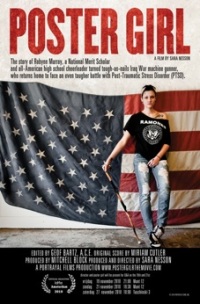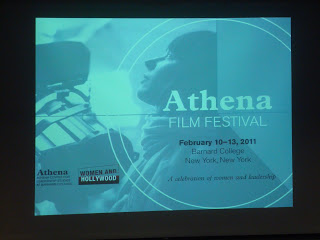Women Still a Rarity in Top Film Jobs from the Los Angeles Times:
“Women held 16% of key jobs such as director and producer on the top 250 films of 2010 (as measured by domestic box-office receipts), according to the Center for the Study of Women in Television and Film at San Diego State University. That’s steady from the 2009 figures and about the same level as in 1998, when the center launched its ‘Celluloid Ceiling’ report.”
Leading Ladies from The Eye:
“From February 10 to 13, Barnard’s Athena Center for Leadership Studies and the group Women in Hollywood will collaborate to create the first annual Athena Film Festival. The festival seeks to be an interactive weekend that addresses issues of female empowerment through film production—featuring both the works of female filmmakers and films about women. The Eye sat down with Kathryn Kolbert, the festival’s cofounder to discuss how the festival will affect the future of female leadership at Barnard.”
The Top 15 Feminist Film Stars from Ecosalon:
” … let’s think about the ladies of authority, the women of wit, the steel magnolias of cinema. For every loveless lass brought to life by a Rom Com Queen, there’s a kick-ass character of empowerment. Here are our 15 favorites.”
The Girls on Film from Den of Geek:
“We may have come a long way since female author, Mary Anne Evans, had to publish under a pseudonym of George Eliot, but it’s blokes that still run the show.
Which is why The Girls on Film is such a breath of fresh air. On paper it sounds like a parody project. A troupe of female actors take on iconic scenes from cult movies, from Fight Club, Star Trek and The Town, reading the same lines, acting the same parts as the men. But the results are no laughing matter.”
The Super Bowl and Violence Against Females from the Daily Kos:
“The other equally critical issue is how we American males define manhood. Far too many of us think it is about violent behavior, warfare, gunplay, mindless and ego-driven competition, and the conquering of each other, or women and girls, by any available means. And this has nothing to do with the debates that have raged for years about there being a spike in domestic violence cases on Super Bowl Sundays because of the drinking and abusive behavior of male sports fans. Hard to pin down that kind of data. But it unquestionably is a day when so many different types of people come together, pause, and watch perhaps America’s bloodiest and most violent sport as if it were a video game.”
Blue Valentine’s Ryan Gosling: The New Voice of Feminism in Hollywood? from BlogHer:
“The ratings war over Blue Valentine may have gotten more press than the stunning film itself — the movie was originally given the dreaded NC-17 branding before The Weinstein Company (who is also fighting the good fight for The King’s Speech) successfully appealed it and earned themselves an R. Surprisingly, it was Ryan Gosling who most notably came to his film’s defense — Melissa Silverstein from Women in Hollywood called him the ‘Hollywood Feminist of the Day’ and was floored by this quote from Gosling …”
“In a Western world where, far too often, human = white and male, queer = white and male, lesbian = white, and woman = white, it is difficult for me, a white gay male, to fully appreciate the struggles for visibility and validation faced by those of us in the queer community without white and male privileges. Why it is that white queer people think telling stories primarily about whites and men is representative of “us” is beyond me.”
Lady Gaga Brings Cholas Back to Pop Culture–Like It or Not from Racialicious:
“What sets Gaga’s use of the term apart, for now – there’s been no video released for ‘Born This Way,’ though she will perform it at the Grammy Awards on Feb. 13 – is the direct use of the word Chola in the lyrics, as opposed to visual shorthand. And that’s where the controversy comes in: the word it’s derived from, Cholo, originated in the 16th century as a slur, similar to “mutt,” in both Perú and Mexico. But in the U.S., some would argue that they’re tied in with the Chicano identity and culture, following the lineage of the Chicano Movement of the 1960s.”
Rediscovering WWII’s female ‘computers’ from CNN:
“Men had built the machine, but Bartik and her colleagues debugged every vacuum tube and learned how to make it work, she said. Early on, they demonstrated to the military brass how the computer worked, with the programmers setting the process into motion and showing how it produced an answer. They handed out its punch cards as souvenirs. They’d taught the massive machine do math that would’ve taken hours by hand.”
“Yolande used her work as a journalist as cover for reporting on Cairo’s power elite – right up to the king — for Israel’s pre-state de facto government, the Jewish Agency. She reported directly to Teddy Kollek, the future long-time mayor of Jerusalem, back when he headed intelligence for the Jewish Agency.”
Athena Film Festival not just for feminists from Columbia Spectator:
“Rah-rah feminism aside, the festival lineup of strong movies with the occasional dash of Hollywood intrigue may also hold attraction for casual cinephiles or the merely star-curious. Debra Granik is one of only 10 women to have ever directed a Best Picture nominee feature film. She and the co-writer of ‘Winter’s Bone,’ Anne Rosellini, will discuss the film with Anne Thompson of the blog Thompson on Hollywood after its screening in Miller Theatre.”
Prevent Official Release of Kanye West’s Women-Hating Monster Video from The Petition Site:
“HipHopConnection.com has leaked a video teaser for the Kanye West hit song ‘Monster’ and what we’ve seen is beyond disturbing. In just 30 seconds, viewers take in image after image of eroticized violence against women:
– Dead women, clad in lingerie, hang by chains around their necks.
– West makes sexual moves toward dead or drugged women propped up in a bed.
– A naked dead or drugged woman lays sprawled on a sofa.”
A Challenge to the Farrelly Brothers from Shakesville:
“That the Farrelly Brothers think sexual harassment and assault is hilarious is not news. The entire premise of There’s Something About Mary was a woman being stalked by multiple men who were deceiving her to try to sleep with her. (Ironically, Brett Favre played the one guy who wasn’t stalking her. Whoooooops!) Kingpin featured a predatory landlady who coerced Woody Harrelson’s character into exchanging sex for rent. Me, Myself & Irene had a scene in which Jim Carrey’s character grabbed a baby off hir nursing mother’s breast and started suckling, to the woman’s horror. One of the many problematic aspects of the premise of Shallow Hal is that the main character, who believes his fat girlfriend to be thin, has sex with her while effectively unable to consent to the actual person with whom he’s having sex. Et cetera.”
Leave your links in the comments!


